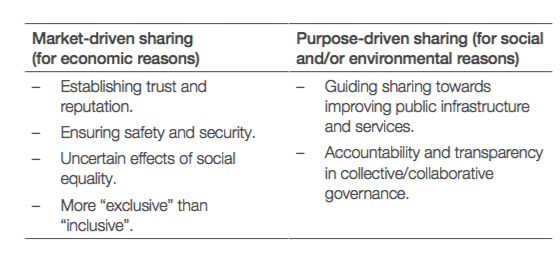Authors: World Economic Forum, in collaboration with PwC
Date published: December 2017
Why did we select this research?
The World Economic Forum’s Future has released its new white paper on the sharing economy in cities, explaining the terminology of the sharing economy, and what it means to be part of a sharing economy. The white paper illuminates the drivers for sharing, and provides recommendations for challenges and externalities; such as establishing trust and ensuring security on online platforms, and the uncertain effects of global sharing on social equality and inclusivity. It further, explores how cities can leverage the potential of the sharing economy in use of municipal goods, civic assets and spaces. The report offers 10 case studies from cities around the world on where and how sharing is changing citizens lives.
Key findings
- Sharing platforms have experienced rapid growth with a 2016 global survey showing that platform companies have a total market value of $4.3 trillion and directly employ 1.3 billion people.
- City governments are advised to leverage the potential of the sharing economy in municipal goods, municipal spaces, civic assets, municipal services and skills and talent of city residents.
To become a sharing city two main steps are encouraged:
- Focus on the purpose of a sharing city. Either A) Economic/market driven sharing .Or B) Sociocultural development or environmental sustainability/purpose driven sharing.
- Focus on the government role(s) in a sharing city. Which could include acting as: regulators; or enablers; or integrators; or collaborators.
Market driven sharing or purpose driven sharing brings on different challenges. Recommendations are provided in the report (pages- 16- 19). See the list of externalities below.

Recommendations for city governments:
- understand the intricacies of the specific operating model and its implications – whether economic (taxes, monopolies), legal (redefining labour laws that cater to freelancers) or social (protecting the rights of participants). Further, cities have to work to involve all necessary levels of government.
- define a regulatory framework that involves the views and concerns of all stakeholders – the sharing platforms, traditional market players and participants across different sectors.
- gather data from sharing platforms to assist data-driven policy making for example in transport planning, and help determine the effects of sharing in a particular sector to inform regulations. One way to address privacy concerns is to provide anonymised data to governments that could help achieve the desired results without compromising user identity.
- define a statuary tax and/or fee structure that clearly identifies the obligations of platforms to buyers and sellers.
As governments should deter from hampering innovation, while trying to achieve economic, social or environmental goals, it is recommended to have have flexibility in their regulatory approach.
Reference
The World Economic Forum. In collaboration with PwC (2017). White Paper: Collaboration in Cities: From Sharing to ‘Sharing Economy’. Retrieved from: http://www3.weforum.org/docs/White_Paper_Collaboration_in_Cities_report_2017.pdf
